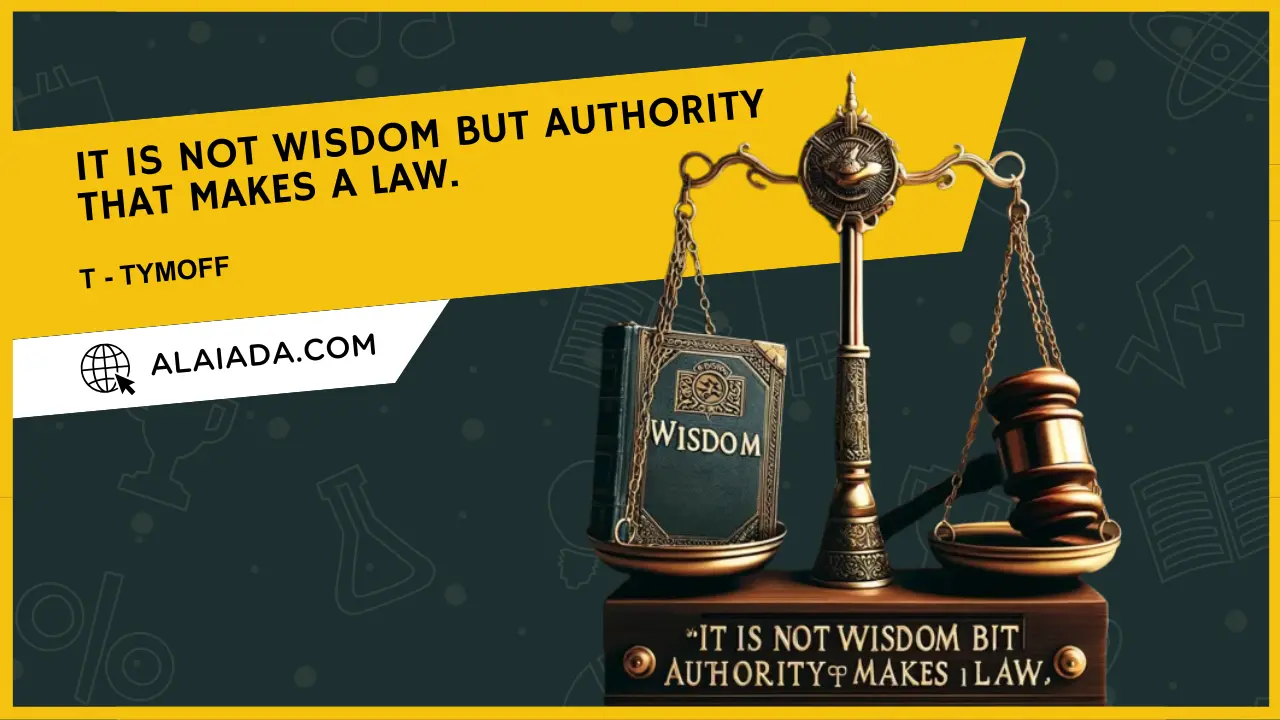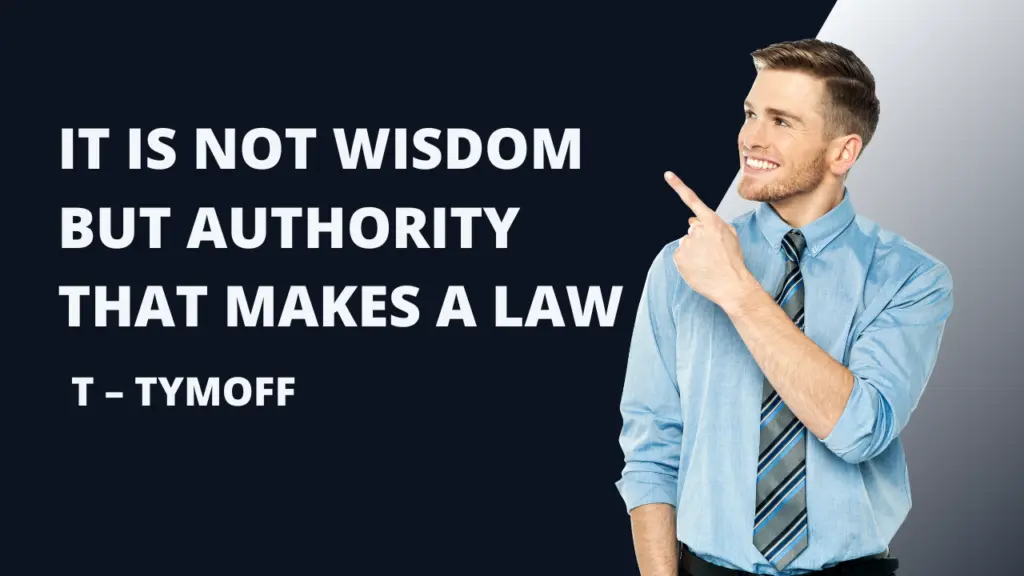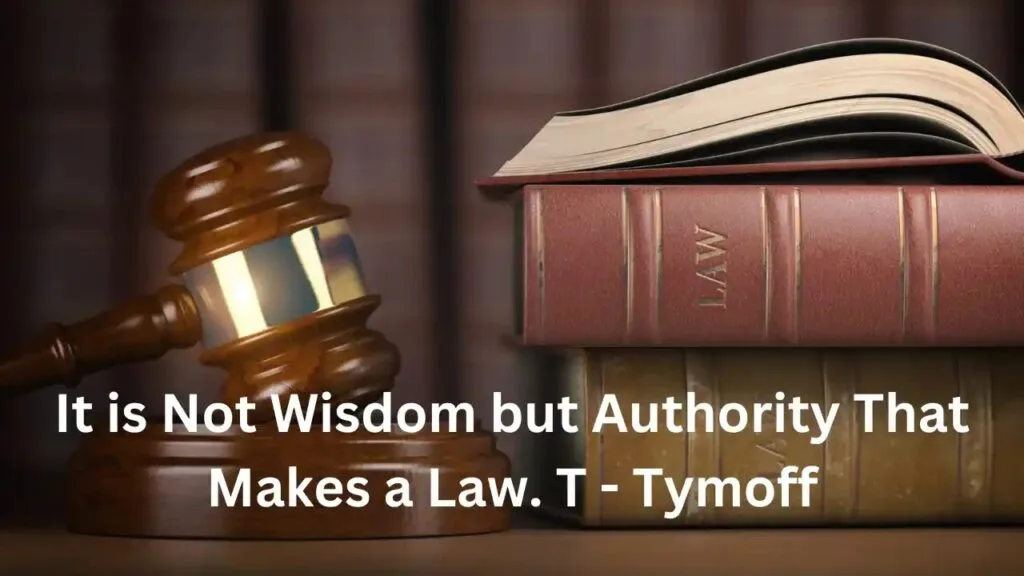It Is Not Wisdom but Authority That Makes a Law. T – Tymoff

Introduction
it is not wisdom but authority that makes a law. t – tymoff In the realm of jurisprudence, the quote “It is not wisdom but authority that makes a law” by Tymoff challenges traditional notions about the foundation of laws. Tymoff’s assertion prompts us to delve into the complex interplay between wisdom and authority in the creation and enforcement of laws. This article aims to explore the implications of this statement, examining how societal norms, historical context, and power dynamics shape the legal landscape.
The Dual Nature of Laws:
Laws, at their core, serve as the framework that governs societies. They dictate what is permissible, what is forbidden, and the consequences for transgressions. Conventionally, the prevailing belief is that laws are crafted based on the collective wisdom of a society, reflecting its values, ethics, and shared understanding of justice. However, Tymoff’s statement challenges this assumption by emphasizing the role of authority in the law-making process.

Authority and Its Influence:
Authority, in the context of law, refers to the power vested in individuals or institutions to create and enforce legal norms. This authority can emanate from various sources, including governments, legislative bodies, and judicial systems. Tymoff’s assertion suggests that laws are not solely born out of thoughtful deliberation and societal consensus but are, to a significant extent, a product of authority.
Historical Perspectives:
To grasp the essence of Tymoff’s statement, it is crucial to examine historical examples where authority played a pivotal role in shaping laws. Throughout history, rulers and governing bodies have often wielded their authority to impose laws that serve their interests or maintain control over the population. Whether through monarchies, dictatorships, or other forms of governance, authority has been a driving force in the establishment of legal frameworks.
The Role of Wisdom:
While authority holds undeniable sway in the realm of law, wisdom, defined as the ability to make sound judgments based on knowledge and experience, should not be disregarded. Wisdom contributes to the development of laws that align with fundamental principles of justice, equality, and human rights. In an ideal legal system, the marriage of authority and wisdom should result in laws that are not only authoritative but also reflective of the collective wisdom of a society.
MUST READ=Indícame el Camino a la Tienda de Alimentos Más Cercana
Contemporary Challenges:
In the modern era, the tension between wisdom and authority persists. The rapid evolution of societies, coupled with advancements in technology and communication, has given rise to new challenges in lawmaking. Policymakers must navigate a complex landscape where traditional wisdom contends with the demands of a changing world. The question arises: how can authority adapt to the evolving needs of society while upholding the wisdom embedded in legal traditions?
Balancing Act:
The synthesis of wisdom and authority is a delicate balancing act. On one hand, an excess of authority without wisdom may lead to arbitrary, unjust laws that undermine the very fabric of a just society. On the other hand, an overreliance on wisdom without the backing of authoritative structures may result in an inability to enforce laws effectively. Striking the right balance requires a nuanced understanding of the dynamic interplay between these two elements.
Legal Legitimacy:
The legitimacy of laws is intricately tied to the perceived fairness and justifiability of both the authority enacting them and the wisdom underpinning them. Laws that lack legitimacy may face resistance and opposition from the populace, undermining their effectiveness. Therefore, it is essential for legal systems to continually assess and reassess the balance between authority and wisdom to maintain the legitimacy of the laws they promulgate.
Global Perspectives on Lawmaking:
Diverse cultures and legal traditions around the world offer a rich tapestry of perspectives on lawmaking. Some societies place a greater emphasis on the wisdom embedded in longstanding traditions, while others may prioritize the authority of a centralized government. Examining global approaches to lawmaking provides valuable insights into the different ways authority and wisdom interact in shaping legal systems.

Challenges to Tymoff’s Assertion:
While Tymoff’s statement challenges conventional wisdom about the origins of laws, it is essential to acknowledge that contemporary legal systems often aspire to integrate both authority and wisdom. Many democratic societies, for instance, seek to derive their authority from the wisdom of the people through representative governance. This model aims to balance the need for authoritative lawmaking with the collective wisdom of the populace.
Conclusion:
In conclusion, Tymoff’s provocative statement invites us to critically examine the intricate relationship between wisdom and authority in the realm of law. While authority undoubtedly plays a significant role in lawmaking, the infusion of wisdom is crucial for ensuring that laws are just, equitable, and reflective of societal values. Striking a harmonious balance between these elements is an ongoing challenge that requires constant introspection and adaptation, particularly in the face of evolving global dynamics. As we navigate the complex landscape of legal theory and practice, the dialogue between wisdom and authority remains at the heart of shaping the laws that govern our societies.











